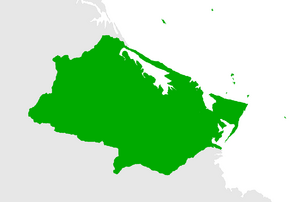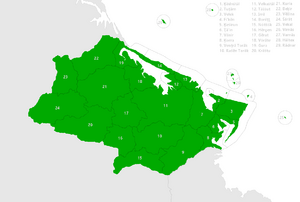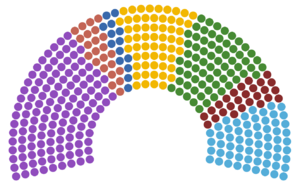Kerussiria
This article is incomplete because it is pending further input from participants, or it is a work-in-progress by one author. Please comment on this article's talk page to share your input, comments and questions. Note: To contribute to this article, you may need to seek help from the author(s) of this page. |
The Republic of Voidkree | |
|---|---|
| Motto: "Va'kaśtir vix́ härenka um nërin raki, Ṡast ķi'ërassik tärir ki'ro tëķra q́a alķalë!" "Undimmed by cloud or shade of night, Here shone for ever fair and bright!" | |
| Anthem: My Fatherland Dear | |
 Map of Voidkree | |
| Capital | Ķëdnśtäl |
| Official languages | Voidite |
| Recognised national languages | Voiditen, Shibettan |
| Ethnic groups | 76.5% Voidian 23.2% Shav-eki |
| Religion | 73.2% No religion 26.8% TBA |
| Demonym(s) | Voidian |
| Government | Parliamentary Republic |
• Ķiver | Belika Na'äkir |
• Prime Minister | Veśen Ag-Óțrall |
| Area | |
• Total | 746,485.46 km2 (288,219.65 sq mi) |
| Population | |
• Estimate | 17,300,000 |
| GDP (PPP) | estimate |
• Total | $1,687,950,000,000 |
• Per capita | $72,169.63 |
| Gini (1611) | low |
| HDI | very high |
| Currency | Ķerel (ĶRL) |
| Date format | dd/mm/yyyy |
| Driving side | right |
| Calling code | +303 |
| ISO 3166 code | VDK |
| Internet TLD | .vdk |
Voidkree [Voiditen: Väțire], officially the Republic of Voidkree [Voiditen: Väțire Ituķur], is a semi-isolationist parliamentary republic located on the eastern coast of Pelia with it's closest neighbours Astronia being on it's southern border. The Republic of Voidkree came to be after the former Premier of the Grand Union of Voidkree, Vera Tuirast, resigned after a series of protests in support democracy and a more democratic nation. The recent period of history has been the most peaceful period in Voidkree's history. The population of about 17 million live peacefully spread out across the country with the capital Ķëdnśtäl containing an estimated 2,200,000 people and the second largest city Velkaśtäl having a population of around 1,500,000 people.
In Voidian society magic and the arcane is no mystery there as most if not all of the populace can use magic or spells in some way though to a simple degree which can be used to contact anyone they have met from far away, being able to make a small pocket dimension or generating a small amount of water. These sorts of spell are usually taught to the people around primary school and some can pursue higher magics later in their education.
Etymology
The name "Voidkree" comes partly from it's native name "Väțire" which is made of two words "väți'o" meaning Void and "ķre" meaning Land, as such the native name "Väțire" infact means "Void Land" or "Land of the Void". This name most likely came from early post-Reset inhabitants who saw the land and thusly the vast and dark jungle as an great and endless unknown to them and having no recollection of ever being here or of it, knowing only that they were surrounded by a jungle so dense, areas beneath the canopy are still to this present day are described as being shrouded in perpetual darkness, only ever broken up by the native bioluminescent plant life. Some old sayings even go as far as referring to the forest as the "Void" and some stories tell of it as "A maze so vast and so dense, even air struggles to find passage through it."
Geography
The geography of Voidkree is rather simplistic with the west containing grassy woodlands with rocky hills and valleys which then gradually becomes more flat and becomes tropical rainforest filled with small rivers, bogs and wetlands as one heads closer to the coast with the coast being entirely covered in tropical peninsulae, islands and capes. The nation's biggest natural landmarks being the Viima Lake, the Viima Spit which separates it from the waters of the Merin Maw and the Mai River.
Administrative divisions
Containing 29 counties, the nation gives a fair amount of devolution to local authorities, which all have their own councils which hold democratic votes on topic pertaining to local laws, new large constructions such as new roads, power generation facilities, schools and etc. The devolution is partly the reason the nation's people are spread across the country as almost every county has it's own school system and university and the basic necessities that people require meaning, individuals do not have to travel far to get an education or for medical aid.
Location and borders
Located on the equator on the east coast of Pelia. It's closest neighbours being Nova Solarius to it's east across the Magna Sea, Choslow to it's north, Kethes to it's west and Astronia to it's south.
History
Antiquity 50,000-10,000 BR
It is speculated from facts such as the skin colour, complexion and along with artefacts of the Voidian people, that long ago the Voidian people most likely inhabited a desert or dry climate before they where shuffled by the Reset. The Voidian people where most likely a sect of nomadic tribes consisting of other but similar tribes all known as "ķe'ețur" by some artefacts which may have a link to the Voiditen word "ķi'iț" meaning "kinfolk". These ķe'ețur would not make a large and permanent civilization until around 3000 BR. Due to the Reset and the Era of Ruin small amounts of artefacts remain making further speculation on the topic difficult.
First Civilization 3000-853 BR
From what artefacts and ruins remain the first true civilization that formed was the Ķe'ețur Ķäṡ'ek, a small desert kingdom located in the middle of what was described as a rocky and vast desert know only as "The Death". This kingdom slowly grew through both marrying into and invading it's desert neighbours and subsequently rose to prominence around the year 853 BR where records state that after marrying into a powerful neighbour and forming the Union of Ķäṡ'ek-Turkäl, commonly known today as the First Union of Voidkree.
1st Union Era 853-403 BR
The Union of Ķäṡ'ek-Turkäl consisted of multiple ķe'ețur which at this time now acted as dynasties had either been diplomatically or forcefully brought into the union. Records from the period state that around this time the Union encompassed several deserts with the population spread across a total of 7 large ķe'ețur and 13 smaller ķe'ețur. The Union through out the next few centuries waxed and waned in size, it's diverse people living their lives in the vast and fortified subterranean cities. The Union was recorded as a superpower in the region and a centre of astronomical knowledge and military might. Though beginning in around year 500 AR, the ancestral tensions between the 20 diverse ķe'ețur would rise, past grudges reignited, mainly between Ķe'ețur Iṡrëķ and Ķe'ețur Kaṡ'amëq́, which, through gaining the support of their fellow ķe'ețur, had split the Union into 3 factions know only through some records as the Neutrals, The Secessionists and The Loyalists. The built up tension and hatred of a hundred years between these factions would come to it's crest in the year 403 BR.
Era of Agony 403-0 BR
The Era of Agony is described as the worst war in the nation's history for the blood shed and agony cause by it for the next 403 years till the reset. Most information of this era comes from the remains of war relics and ruins.
Deterioration
In the year 403 BR the three factions of Ķe'ețur in the Union government began to prepare for the worst, scheming for how to deal with the imminent civil war for the time for diplomacy had long since passed and civil war was almost certain and it would not end easily. At some point some of the three factions began to also break into smaller factions due to clashes in ideology and beliefs. Around 9 major factions existed just before the beginning of the Agony Wars.
Agony Wars
The spark to light the flame of civil war was an armed clash between the Ķe'ețur He'ķan, a member of a Secessionist-aligned coalition and Ķe'ețur Maṡë'iķ, a Loyalist ķe'ețur. After this clash, the Agony Wars began with a total of 13 sub-wars going on in the midst of the civil war between the three original factions. The desert nation quickly began to fall apart ever more, it's civilians now forming independent warbands and city-states, attempting to endure so that the people of their cities may live a life in relative peace. Only a few Ķe'ețur managed to survive till the end of the Agony Wars and the Ķe'ețur that became Voidkree, Ķe'ețur Ṡa'aķal had ,a century before the end of the conflict, gone in to hiding amongst the desert's valleys and canyons. Some ruins state this live was rather nice with a few decades of actual peace, but this would usually be broken up by a small warband discovering the people and attempting to pillage the hidden desert city.
Union records stated before the war that the nation had somewhere near 84 million people living under the Union's banner. Only 16 million remained by the end of the Agony Wars leading to a total supposed death toll of 68 million. Due to the severity of the supposed death toll, after these discoveries in the nation's history were made after the reset, a national holiday, known as the Festival to the Forgotten, was formulated to mourn the millions of nameless innocents who died for petty causes.
2nd Union Era 0-1543 AR
After the Reset, Voidkree formed as the 2nd Union of Voidkree. Through the coming centuries the nation remained generally rather isolationist with it only 600 years after the reset opening it's ports to outsiders and even then that was limited with outsiders only allowed a few metres outside the port and most ports being walled off from the rest of any port city. The 2nd Union generally prospered with minor outbreaks of civil disputes generally over rights and freedoms. Largest among them being the Shibettan-Voidian War which broke out in 651 AR and lasted 39 years. The only time during this era did Voidkree engage a foreign nation was during the Triaas Isles Affair.
After those two incidents the nation enjoyed a relatively sound peace for the next centuries, but after a serious stagnation and general dislike of the one party government in 1543, along with a series of large protest that swept across the country the government was forced to peacefully resign and allow for an era of true democracy.
Shibettan-Voidian War
Due to a serious issue of slavery and oppression against Shibettans, the relations between the two sapient species was at an all time low and on the the 23rd night of Lux the rebellion began in the north.
Triass Isles Affair
During the Shibettan-Voidian War, the state was too preoccupied with repelling the Shibettan insurrectionists that at the time the islands fell into a period of neglect and resources once meant for it's development where routed to the war and the people of the island sought independence so that they could continue to prosper, at this moment the Soritas Dynasty took the opportunity to take the islands in exchange for an end to their neglect. After the Shibettan-Voidian War had begun to slow down and an end was in sight, naval commanders Ițķën Ag-Tóriķn, Känl Ag-Ṡurrukn Ṯiṡel and Țśnin Ag-Urninó began planning on the retaking of the isles in 688 AR.
Modern Voidkree 1543-Present AR
Following the peacefully resignation of the government, the Republic of Voidkree would be formed and would have far greater freedoms than it's predecessor though still maintained it's hardline on isolationism, but this too came to an end in the year 1599 AR, where the parliament ruled in favour of raising the nation from isolation and fully opening it's borders to the open world, though this decision has been met with some frustration from the Republic's more staunch and conservative civilians.
Currently the nation has been expanding it's foreign affairs by joining MEU and trading more intensively with it's neighbours.
Politics
Government
The government of the Voidkree is a semi-isolationist parliamentary republic ruled by a prime minister and their chosen government, with the president or locally known as Ķiver as a figure head meant to pick and instate a prime minister. The parliament or locally the Upper Council, has a total of 841 seats in which at maximum have 7 of the largest parties seated in the Upper Council with the current ruling party being the Voidian Centre Reform Party or VCRP. Smaller parties are placed in the Lower Council which is a watered down version of the Upper Council where the 5 most popular smaller parties converse on topics that if agreed upon are sent to the Upper Council to be discussed.
Foreign Relations
The foreign relations for Voidkree are lack luster to say the least as through most of it's history past the Great Shuffle, the nation entered an era of isolationism that has only in recent years started to dissipate. Currently the foreign relations of Voidkree involve Choslow, Nova Solarius and Santi Rasta.
Military
The military of Voidkree, Armed Forces of Voidkree or AFVK for short, consists of about 5 main branches; the Voidian Defence Forces, the Voidian Air Force, the Voidian Naval Forces, the Voidian Steel Guards and the Voidian Deterrence Task Forces. It contains the highest amount of magic and arcana in the entire country, which it uses to enchant shell, vehicles, weapons or armour in ways technology would have made costly such as imbuing tanks or soldiers to temporarily make them harder to hit by blurring their image or making shells explode into a massive fireball upon impact.
The foremost goals of the AFVK is to ensure that the air, sea and ground are kept clear of unknown foreign crafts and individuals, either escorting them out of the country's borders or escorting them to their destination if they give identification and intent, if not the military is allowed to shoot down or fire warning shots. The other goal is to ensure the safety of the civilian populace which has prompted the AFVK to set up most of their Ground to Air Systems around civilian centres and almost every civilian center near the borders having fortifications in some way or another, be that concrete fortifications with short and long range AA and AT capabilities to dormant explosives ready to be activated in case of a war.
Economy
The Voidian economy is an example of a mixed economy; a prosperous capitalist welfare state, it features a combination of free market activity and large state ownership in certain key sectors, influenced by both liberal governments from the late 16th century and later by social democratic governments in early 17th century. Public health care in Voidkree is free (after an annual charge of around 200 ķerel for those over 17), and parents have 46 weeks paid parental leave. The state income derived from natural resources includes a significant contribution from petroleum production and mining. Voidkree has an unemployment rate of 4.8%, with 68% of the population aged 15–74 employed.
Demographics
Ethnic groups
The Republic contains 2 major ethnic groups, the larger one being the Voidians taking up 76.5% of the population and the smaller one being the Shibettans who take up the remaining 23.5%. Either ethnic group have their similarities such as their food, music and dances but they also have their differences such as their languages or appearance, with the Voidians being humans with beige tanned skin, usually with brown eyes and hair speaking a Karkiten language while the Shibettans are what appear to be feathered and beaked kobold like creatures with beige, brown to black feathers, usually shorter than a human and speaking an Halmanic language.
Despite the fact that both have equal rights, a small minority of Shibettans in recent decades have formed a faction known as the Shibettan Freedom Front or SFF for short, they believe that their people should govern themselves and that shibettans and accuse Voidkree of secretly oppressing shibettans and express their dislike of the government through means of terror, though this movement is rather niche and even has a large majority of Shibettans wanting it's downfall and some actively working against it.
Health
Voidkree, by constitution, guarantees free, universal health care for all Voidian citizens, through a compulsory state health insurance program. The Ministry of Health of Voidkree oversees the Voidian public healthcare system, and the sector employs more than a six hundred thousand people. Counties also have their own departments of health that oversee local administration.
Voidkree spent 10.7% of its GDP on Healthcare in 1611. In 1611, the overall life expectancy in Voidkree at birth was 94.05 years (91.3 years for males and 96.8 years for females), and it had a very low infant mortality rate (5 per 1,000 live births).
Culture
The culture of Voidkree involves aspects that where indigenous to the area Voidkree presided over before the time of the Great Shuffle, such as saunas, food and social traditions. In modern times the culture has incorporated other aspects such as egalitarianism and work ethic involving diligence, discipline, and frugality. The nation, due to the Great Shuffle, is a unique cultural anomaly in the Magna Region, holding little to nothing in relation to it's neighbours which can also be attributed to the nation's distrust of it's other neighbours, resulting in the nation falling into an era of isolationism. Though in recent years the distrust has declined, as evident in the nation's recent accession to MEU, there still remains some distrust and is the reason the nation has not sought further cooperation with it's neighbours.
Despite the nation's large amount of atheism, it's people still have a heavy belief in animism and mythological creatures.





